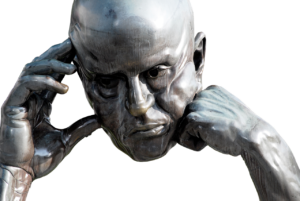Caffeine and Headaches [Show Notes]

How Blood Flows
Blood vessels are like flexible pipes that run to every nook and cranny of your body. When they dilate (or widen), they let more blood through; when they constrict (or narrow), they let less blood through. If the blood vessels constrict and the body part at the end of that path feels deprived, it may send a pain signal to the brain.
If the blood vessels constrict or dilate quickly, your body will feel it and it may be translated as pain.
Headaches can be the result of an overall constriction of blood vessels in the head.
Your brain is full of neurons (nerve cells), and even though they translate pain, they don’t sense pain.
Caffeine Can Help
Caffeine can gently open up constricted blood vessels.
Your body is efficient, so when you sleep, certain blood vessels to certain parts of your body (like digestive tract and skeletal muscles) constrict to maximize blood flow to other places. Once you wake up, the process by which the body re-dilates those vessels can be slow. Exercise can make it faster. So can caffeine.
The reason why caffeine helps us wake up: it dilates the blood vessels so more blood flows to the areas of the brain that control attention and focus and alertness.
Caffeine pill = 200 mg
Water for a headache?
If you’re dehydrated, your blood will be slightly thicker and may be harder to get to the nooks and crannies, and that can cause headache. Dehydration can also cause low blood pressure can lead to headache.
The reason caffeine is in OTC headache pills – 1) caffeine can dilate blood vessels, and 2) it speeds up heart rate with increases how fast the other meds flow through the body.
Connect with me
Support us on Patreon
*NEW* Join the Pharmacist Answers Podcast Community on Facebook
Subscribe: iTunes, Stitcher, GooglePlay, TuneIn Radio
Music Credits: “Radio Martini” Kevin MacLeod (incompetech.com) Licensed under Creative Commons: By Attribution 3.0 http://creativecommons.org/licenses/by/3.0/




